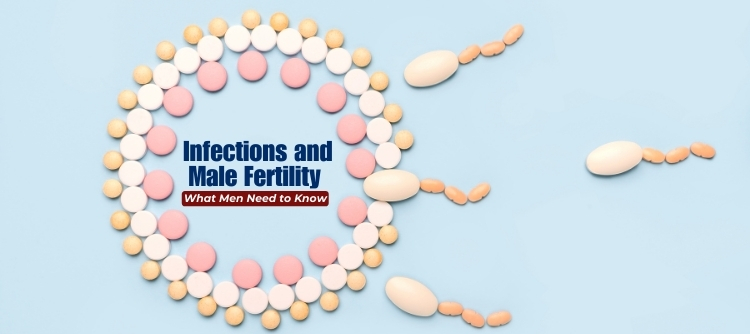Infections and Male Fertility: What Men Need to Know

Male infertility is an often-overlooked topic that can deeply affect a couple’s journey to parenthood. One of the significant yet lesser-discussed causes of male infertility is infections. These infections can interfere with sperm production, function, and transportation, making it challenging for men to contribute to conception. Understanding the connection between infections and male fertility is essential for timely diagnosis and treatment. At Nishant Fertility Centre, we emphasize the importance of awareness and early intervention to address such issues effectively.
Understanding Male Infertility
Male infertility refers to a man’s inability to contribute to conception despite frequent and unprotected intercourse for a year or more. It accounts for nearly 40–50% of infertility cases in couples. One of the leading factors contributing to male infertility is infections that can damage the reproductive system.
If you are seeking expert guidance and treatment for male infertility, consulting a male infertility doctor in Jaipur can help identify the root cause and offer suitable solutions.
How Do Infections Affect Male Fertility?
Infections can impact male fertility in various ways:
• Sperm Health: Infections like orchitis (inflammation of the testicles) can directly harm sperm production, leading to a low sperm count or poor motility.
• Blockages: Infections such as epididymitis can cause scarring in the reproductive tract, blocking the transport of sperm.
• Hormonal Imbalance: Certain infections may disrupt hormonal signals, affecting sperm production and libido.
• Testicular Damage: Severe or untreated infections can result in permanent damage to the testes, reducing fertility potential.

Common Infections That Affect Male Fertility
1. Urinary Tract Infections (UTIs)
UTIs are a common cause of discomfort and inflammation in the urinary and reproductive tracts. Chronic or recurrent UTIs can affect sperm motility and cause blockages in the ejaculatory ducts.
2. Sexually Transmitted Infections (STIs)
STIs like chlamydia, gonorrhea, and syphilis can lead to long-term complications if left untreated. These infections may cause inflammation, scarring, and even infertility in severe cases. Regular STI screening is crucial for reproductive health.
3. Prostatitis
Prostatitis, an inflammation of the prostate gland, can result from bacterial infections. It affects semen quality and can cause painful ejaculation, further complicating fertility issues.
4. Mumps Orchitis
Mumps, a viral infection, can cause inflammation in the testicles (mumps orchitis) if contracted after puberty. This condition can lead to reduced sperm production and permanent testicular damage.
5. Epididymitis
Epididymitis, the inflammation of the epididymis, is often caused by bacterial infections. It can result in scarring and blockages in the sperm transport pathway.
Symptoms of Infections That May Affect Fertility
Recognizing the symptoms of infections is vital for timely diagnosis and treatment.
Common symptoms include:
• Pain or swelling in the testicles.
• Burning sensation during urination.
• Discharge from the penis.
• Painful ejaculation.
• Blood in urine or semen.
• Fever or chills accompanying genital discomfort.
If you notice any of these signs, seek medical advice promptly from a reliable male infertility doctor in Jaipur to prevent further complications.
Diagnosis of Infections Affecting Fertility
Diagnosing infections that impact male fertility involves a series of tests and examinations, such as:
• Physical Examination: Doctors assess any visible abnormalities or swelling in the reproductive organs.
• Semen Analysis: This test evaluates sperm count, motility, and morphology to detect potential issues.
• Urine Culture: It helps identify the presence of bacterial infections.
• Hormonal Testing: Hormone levels are checked to ensure they are conducive to sperm production.
• Ultrasound: Imaging tests like scrotal ultrasound can detect blockages or damage to the reproductive organs.
Treatment Options for Infections
Treating infections that affect male fertility depends on the type and severity of the infection. Some common approaches include:
• Antibiotics: Bacterial infections are often treated with prescribed antibiotics. Preventing long-term harm requires early intervention.
• Lifestyle Changes: Quitting smoking, limiting alcohol consumption, and maintaining hygiene can reduce the risk of recurrent infections.
• Surgical Intervention: In cases of severe scarring or blockages, surgical procedures may be necessary to restore normal sperm transport.
• Counseling and Support: Infertility can be emotionally taxing. Counseling can help couples navigate these challenges together.
Preventing Infections That Impact Fertility
Prevention is always better than cure. Here are some tips to minimize the risk of infections:
• Practice Safe Sex: Use protection to prevent sexually transmitted infections.
• Maintain Hygiene: Proper hygiene reduces the risk of bacterial infections.
• Regular Health Check-ups: Routine screenings can help detect infections early and ensure timely treatment.
• Boost Immunity: A healthy diet and regular exercise strengthen the immune system, reducing the likelihood of infections.
Conclusion
Infections are a significant yet often preventable cause of male infertility. Early detection and appropriate treatment can significantly improve fertility potential. If you or someone you know is experiencing symptoms that could indicate an infection affecting fertility, don’t hesitate to seek medical advice.
Consulting a male infertility doctor in Jaipur ensures a thorough evaluation and effective solutions tailored to your needs. Remember, addressing these issues promptly can make a significant difference in your journey toward parenthood.
For expert care and guidance, trust Nishant Fertility Centre, where hope meets expertise to create miracles every day.
